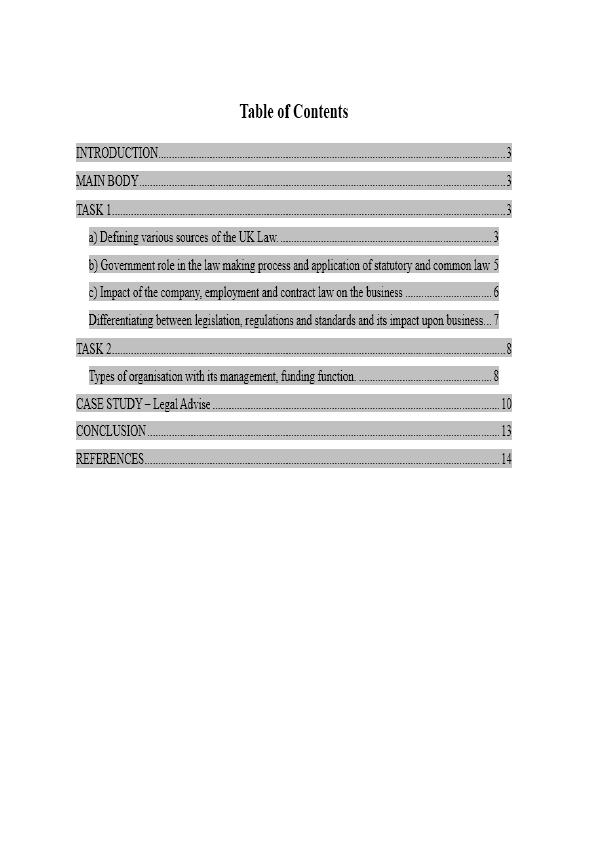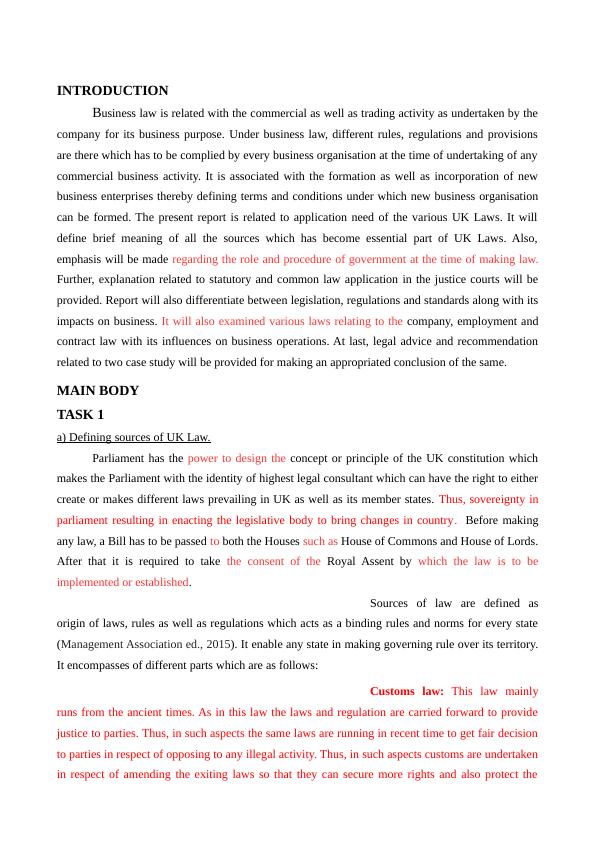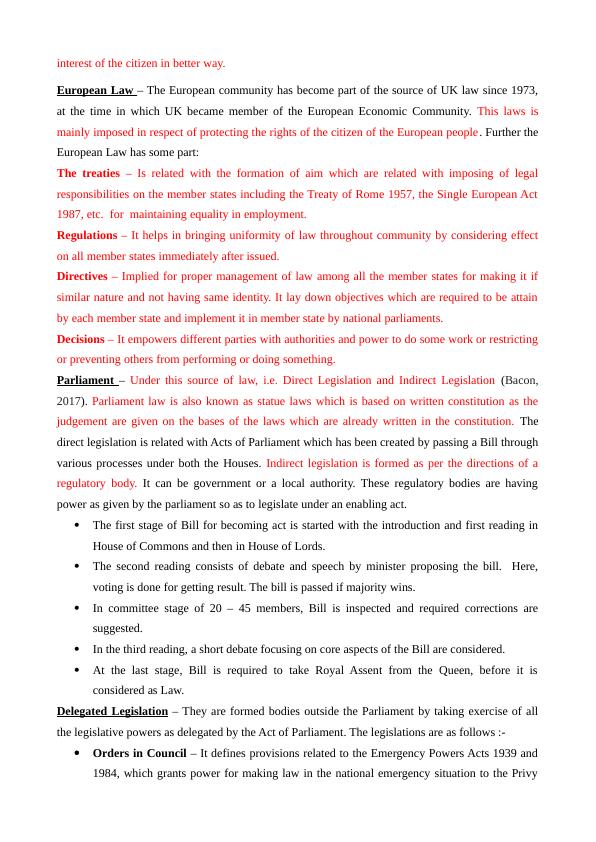Sources of UK Law and their Impact on Business
Added on 2023-01-19
15 Pages5420 Words77 Views
BUSINESS LAW


INTRODUCTION
Business law is related with the commercial as well as trading activity as undertaken by the
company for its business purpose. Under business law, different rules, regulations and provisions
are there which has to be complied by every business organisation at the time of undertaking of any
commercial business activity. It is associated with the formation as well as incorporation of new
business enterprises thereby defining terms and conditions under which new business organisation
can be formed. The present report is related to application need of the various UK Laws. It will
define brief meaning of all the sources which has become essential part of UK Laws. Also,
emphasis will be made regarding the role and procedure of government at the time of making law.
Further, explanation related to statutory and common law application in the justice courts will be
provided. Report will also differentiate between legislation, regulations and standards along with its
impacts on business. It will also examined various laws relating to the company, employment and
contract law with its influences on business operations. At last, legal advice and recommendation
related to two case study will be provided for making an appropriated conclusion of the same.
MAIN BODY
TASK 1
a) Defining sources of UK Law.
Parliament has the power to design the concept or principle of the UK constitution which
makes the Parliament with the identity of highest legal consultant which can have the right to either
create or makes different laws prevailing in UK as well as its member states. Thus, sovereignty in
parliament resulting in enacting the legislative body to bring changes in country. Before making
any law, a Bill has to be passed to both the Houses such as House of Commons and House of Lords.
After that it is required to take the consent of the Royal Assent by which the law is to be
implemented or established.
Sources of law are defined as
origin of laws, rules as well as regulations which acts as a binding rules and norms for every state
(Management Association ed., 2015). It enable any state in making governing rule over its territory.
It encompasses of different parts which are as follows:
Customs law: This law mainly
runs from the ancient times. As in this law the laws and regulation are carried forward to provide
justice to parties. Thus, in such aspects the same laws are running in recent time to get fair decision
to parties in respect of opposing to any illegal activity. Thus, in such aspects customs are undertaken
in respect of amending the exiting laws so that they can secure more rights and also protect the
Business law is related with the commercial as well as trading activity as undertaken by the
company for its business purpose. Under business law, different rules, regulations and provisions
are there which has to be complied by every business organisation at the time of undertaking of any
commercial business activity. It is associated with the formation as well as incorporation of new
business enterprises thereby defining terms and conditions under which new business organisation
can be formed. The present report is related to application need of the various UK Laws. It will
define brief meaning of all the sources which has become essential part of UK Laws. Also,
emphasis will be made regarding the role and procedure of government at the time of making law.
Further, explanation related to statutory and common law application in the justice courts will be
provided. Report will also differentiate between legislation, regulations and standards along with its
impacts on business. It will also examined various laws relating to the company, employment and
contract law with its influences on business operations. At last, legal advice and recommendation
related to two case study will be provided for making an appropriated conclusion of the same.
MAIN BODY
TASK 1
a) Defining sources of UK Law.
Parliament has the power to design the concept or principle of the UK constitution which
makes the Parliament with the identity of highest legal consultant which can have the right to either
create or makes different laws prevailing in UK as well as its member states. Thus, sovereignty in
parliament resulting in enacting the legislative body to bring changes in country. Before making
any law, a Bill has to be passed to both the Houses such as House of Commons and House of Lords.
After that it is required to take the consent of the Royal Assent by which the law is to be
implemented or established.
Sources of law are defined as
origin of laws, rules as well as regulations which acts as a binding rules and norms for every state
(Management Association ed., 2015). It enable any state in making governing rule over its territory.
It encompasses of different parts which are as follows:
Customs law: This law mainly
runs from the ancient times. As in this law the laws and regulation are carried forward to provide
justice to parties. Thus, in such aspects the same laws are running in recent time to get fair decision
to parties in respect of opposing to any illegal activity. Thus, in such aspects customs are undertaken
in respect of amending the exiting laws so that they can secure more rights and also protect the

interest of the citizen in better way.
European Law – The European community has become part of the source of UK law since 1973,
at the time in which UK became member of the European Economic Community. This laws is
mainly imposed in respect of protecting the rights of the citizen of the European people. Further the
European Law has some part:
The treaties – Is related with the formation of aim which are related with imposing of legal
responsibilities on the member states including the Treaty of Rome 1957, the Single European Act
1987, etc. for maintaining equality in employment.
Regulations – It helps in bringing uniformity of law throughout community by considering effect
on all member states immediately after issued.
Directives – Implied for proper management of law among all the member states for making it if
similar nature and not having same identity. It lay down objectives which are required to be attain
by each member state and implement it in member state by national parliaments.
Decisions – It empowers different parties with authorities and power to do some work or restricting
or preventing others from performing or doing something.
Parliament – Under this source of law, i.e. Direct Legislation and Indirect Legislation (Bacon,
2017). Parliament law is also known as statue laws which is based on written constitution as the
judgement are given on the bases of the laws which are already written in the constitution. The
direct legislation is related with Acts of Parliament which has been created by passing a Bill through
various processes under both the Houses. Indirect legislation is formed as per the directions of a
regulatory body. It can be government or a local authority. These regulatory bodies are having
power as given by the parliament so as to legislate under an enabling act.
The first stage of Bill for becoming act is started with the introduction and first reading in
House of Commons and then in House of Lords.
The second reading consists of debate and speech by minister proposing the bill. Here,
voting is done for getting result. The bill is passed if majority wins.
In committee stage of 20 – 45 members, Bill is inspected and required corrections are
suggested.
In the third reading, a short debate focusing on core aspects of the Bill are considered.
At the last stage, Bill is required to take Royal Assent from the Queen, before it is
considered as Law.
Delegated Legislation – They are formed bodies outside the Parliament by taking exercise of all
the legislative powers as delegated by the Act of Parliament. The legislations are as follows :-
Orders in Council – It defines provisions related to the Emergency Powers Acts 1939 and
1984, which grants power for making law in the national emergency situation to the Privy
European Law – The European community has become part of the source of UK law since 1973,
at the time in which UK became member of the European Economic Community. This laws is
mainly imposed in respect of protecting the rights of the citizen of the European people. Further the
European Law has some part:
The treaties – Is related with the formation of aim which are related with imposing of legal
responsibilities on the member states including the Treaty of Rome 1957, the Single European Act
1987, etc. for maintaining equality in employment.
Regulations – It helps in bringing uniformity of law throughout community by considering effect
on all member states immediately after issued.
Directives – Implied for proper management of law among all the member states for making it if
similar nature and not having same identity. It lay down objectives which are required to be attain
by each member state and implement it in member state by national parliaments.
Decisions – It empowers different parties with authorities and power to do some work or restricting
or preventing others from performing or doing something.
Parliament – Under this source of law, i.e. Direct Legislation and Indirect Legislation (Bacon,
2017). Parliament law is also known as statue laws which is based on written constitution as the
judgement are given on the bases of the laws which are already written in the constitution. The
direct legislation is related with Acts of Parliament which has been created by passing a Bill through
various processes under both the Houses. Indirect legislation is formed as per the directions of a
regulatory body. It can be government or a local authority. These regulatory bodies are having
power as given by the parliament so as to legislate under an enabling act.
The first stage of Bill for becoming act is started with the introduction and first reading in
House of Commons and then in House of Lords.
The second reading consists of debate and speech by minister proposing the bill. Here,
voting is done for getting result. The bill is passed if majority wins.
In committee stage of 20 – 45 members, Bill is inspected and required corrections are
suggested.
In the third reading, a short debate focusing on core aspects of the Bill are considered.
At the last stage, Bill is required to take Royal Assent from the Queen, before it is
considered as Law.
Delegated Legislation – They are formed bodies outside the Parliament by taking exercise of all
the legislative powers as delegated by the Act of Parliament. The legislations are as follows :-
Orders in Council – It defines provisions related to the Emergency Powers Acts 1939 and
1984, which grants power for making law in the national emergency situation to the Privy

End of preview
Want to access all the pages? Upload your documents or become a member.
Related Documents
Business Law Assignment - UKlg...
|8
|1246
|74
UK Business Law Assignmentlg...
|15
|5356
|32
Business Law: Sources, Role of Government, Types of Businesslg...
|12
|3981
|43
(Solution) Unit 7 - Business Lawlg...
|11
|3435
|258
Business Law: Sources, Impact, and Types of Businesseslg...
|16
|5128
|80
Business Law Types of Sources - Assignmentlg...
|11
|3706
|403
